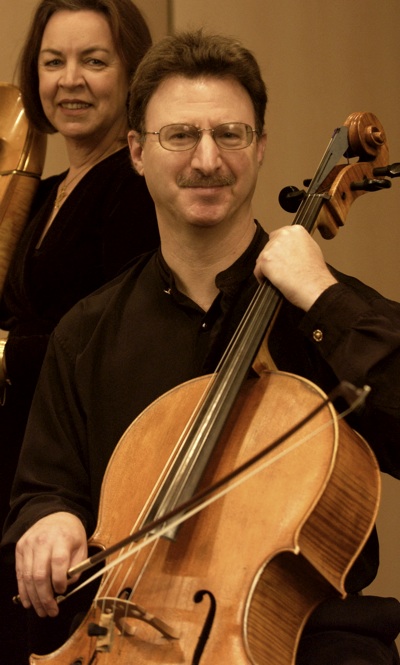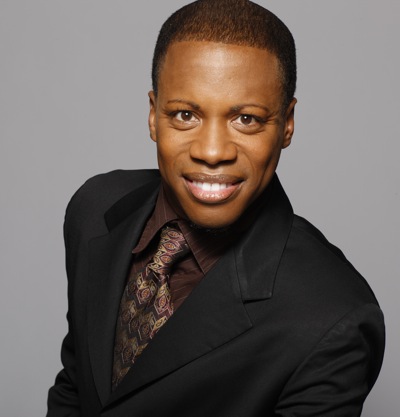A program packed with religious Mysteries, swaggering horns, and coy piano phrases.
For an end-of-season program that bordered on extravaganza, the Oakland East Bay Symphony paired the world premiere of Daniel Reiter’s Mysterium with Bach’s glorious Magnificat, with singers from the Pacific Boychoir and four excellent soloists.
And that was all before intermission.
After came pianistic fireworks in Beethoven’s “Emperor” concerto and a Cesar Franck “potboiler,” as Maestro Michael Morgan described that horn-heavy piece. At Oakland’s art-deco bejeweled Paramount Theater on May 3, a pleased crowd got more than they expected and even stood to applaud pianist Terrence Wilson in a program dubbed “Saints and Sinners.”
 Speaking beforehand, Morgan welcomed the opportunity to encourage and commission Mysterium, the work of the Symphony’s long-time principal cellist. Reiter, who is also the principal cellist of the Festival Opera Orchestra, Diablo Ballet, and Fremont Symphony, supplements classical roots with jazz and Indian training, and those influences could be heard in his composing.
Speaking beforehand, Morgan welcomed the opportunity to encourage and commission Mysterium, the work of the Symphony’s long-time principal cellist. Reiter, who is also the principal cellist of the Festival Opera Orchestra, Diablo Ballet, and Fremont Symphony, supplements classical roots with jazz and Indian training, and those influences could be heard in his composing.
Over the years, not only have I have enjoyed Reiter’s opulent tones and a surprise jazz romp with Detroit violinist Regina Carter, but also several of his own compositions, including Reiter’s Raga with Earplay, and an evening of cello and harp duets, which he wrote for his wife, OEBS harpist Natalie Cox.
The slow but deceptively difficult weave of Mysterium followed an arc that describes a Kabbalistic path to spiritual self-awareness, according to program notes by Reiter. Harp was prominent, embellishing string phrases with a glitter of questions. The work was meditative, strongly pulsed and coloristic, with absorbing flute solos by Alice Lenaghan, and bass and clarinet taking turns with the material. Cello and violin paired notes, and then Reiter took a solo, moving and vaguely Hebraic, with the inward quality and melismas of prayer.
They moved into agitation and a final jubilance while retaining their innate plasticity, an amorphous but hot plasma release not unlike the micro-polyphony of Ligeti.
As instrumentalists decamped for the reduced orchestra of Bach’s much-loved Magnificat in D Major, young singers of the Pacific Boychoir streamed onstage. Boys replaced sopranos and altos and guest adult tenors and baritones took their back for the lower two parts. Shawnette Sulker, known to Bay Area audiences for her nimble voice and smooth reach, soared as the soprano soloist. She recently co-starred in the West Edge Opera’s Bonjour M. Gauguin to critical praise. Her counterpart, Nikolas Nackley, brought a naturalistic heft to the baritone line, part trepidation and part the reverberant cough of a lion, and imbuing his solos with a concrete approach to the Ineffable. An unexpected bonus was countertenor William Sauerland, whose absolute purity and careful consonants were a joy to hear in his alto solos.
The only jarring note was the amplification, which is being introduced to allow these compositions to be performed here. Subtle enough for much of the audience, if you were too close to the speakers it created an unflattering flattening, not unlike listening to a CD instead of to live performance. While sound engineers were on hand at the back to implement and adjust the electronics, it’s going to take some serious hardware to overcome the sheer size of the hall, for a sound that blooms in the space to combine focus, blend, consistency… and is unnoticeable! While that is a tall order, this concert displayed a quantum advance into the next generation of sound technology.
After Bach’s grace we moved on to Beethoven’s effortless power, with a piano concerto that is surprisingly airy for the brooding genius. Terrence Wilson turned runs into trills and vice versa with an arched fingering that created a spacious luminosity. Morgan shaped the orchestral phrases into blossoms of sound, by turns imperious, lushly joyful, and with a potency that hovered between heartbreak and affirmation.
 It was a grand rendition of a favorite concerto, and Wilson’s chiseled notes were a thousand times better than the more usual blunderbusses.
It was a grand rendition of a favorite concerto, and Wilson’s chiseled notes were a thousand times better than the more usual blunderbusses.
To close out the season, Morgan chose the rarely performed Le Chausseur Maudit (The Accursed Huntsman) by Franck. Led by Meredith Brown, the horns were exceptionally virile, with lugubrious strings to caution those bold fifths of the hunt. The orchestra delivered both tension and tautness.
While this is the last subscription concert, the Symphony has added a special concert on Saturday, June 1 at 8:00 as a tribute to Dave Brubeck. Along with the OEBS will appear trombone and bass player Chris Brubeck, pianist Taylor Eigsti, saxophonist Dayna Stephens, drummer Jason Lewis, jazz vocalist Wesla Whitfield, pianist Mike Greensill, vocalist Christabel Nunoo and special guest mezzo-soprano Frederica von Stade. Details at www.oebs.org.
—Adam Broner
Photo top, composer and cellist Daniel Reiter and harpist Natalie Cox; bottom, pianist Terrence Wilson, photo by Fadil Berisha.
